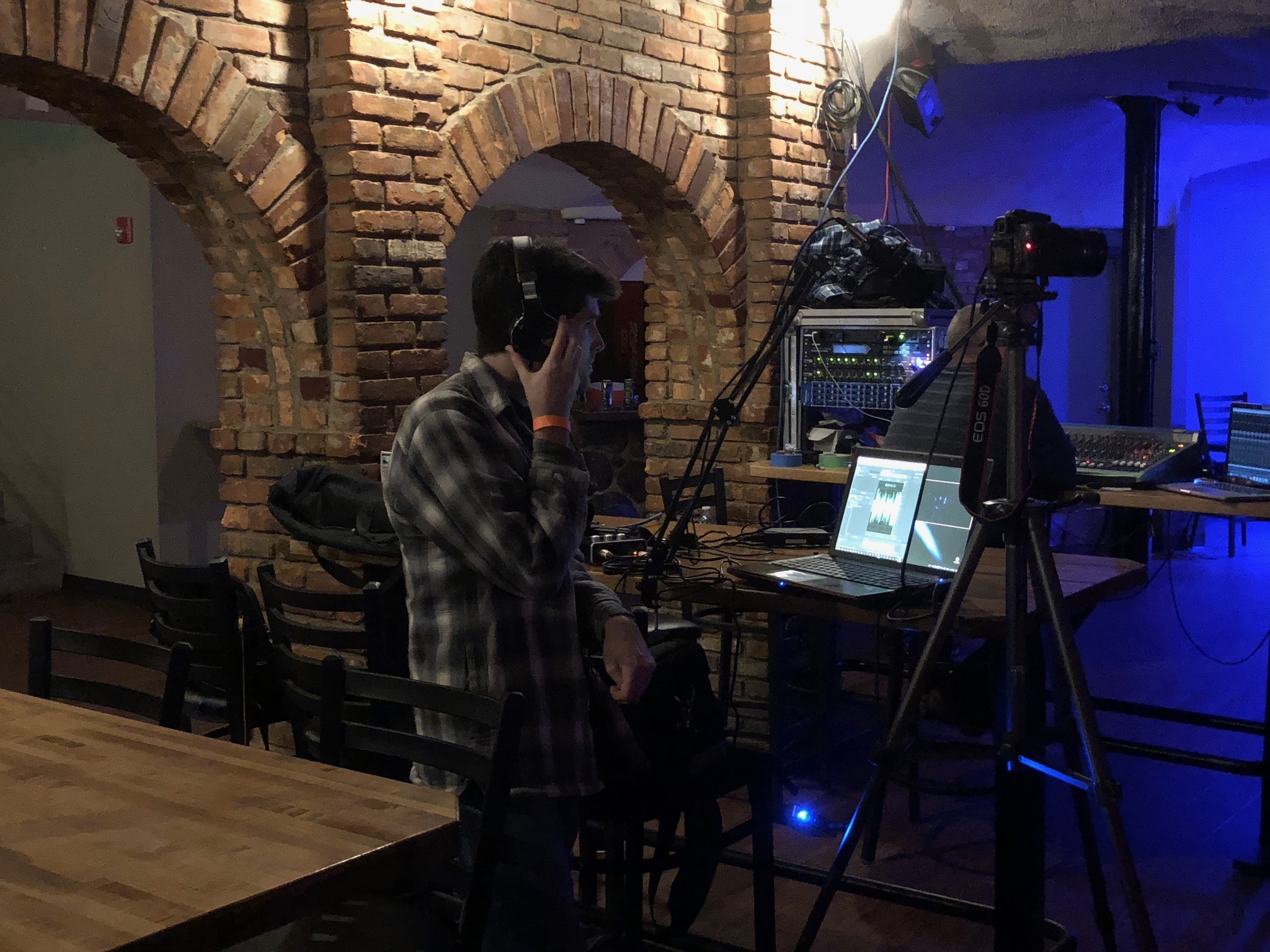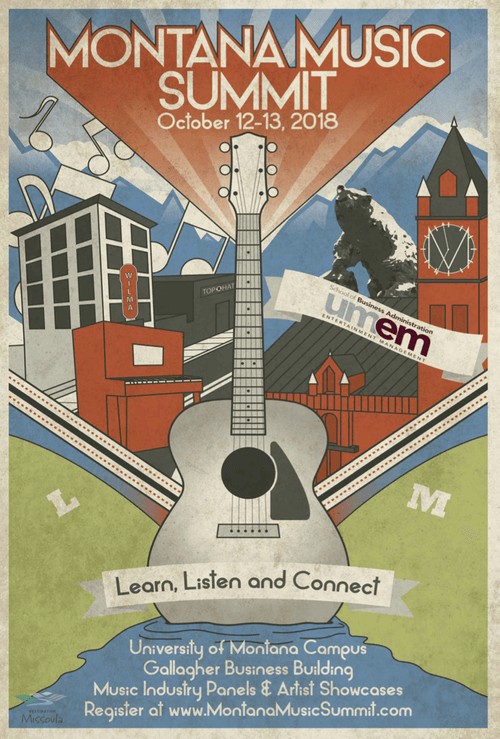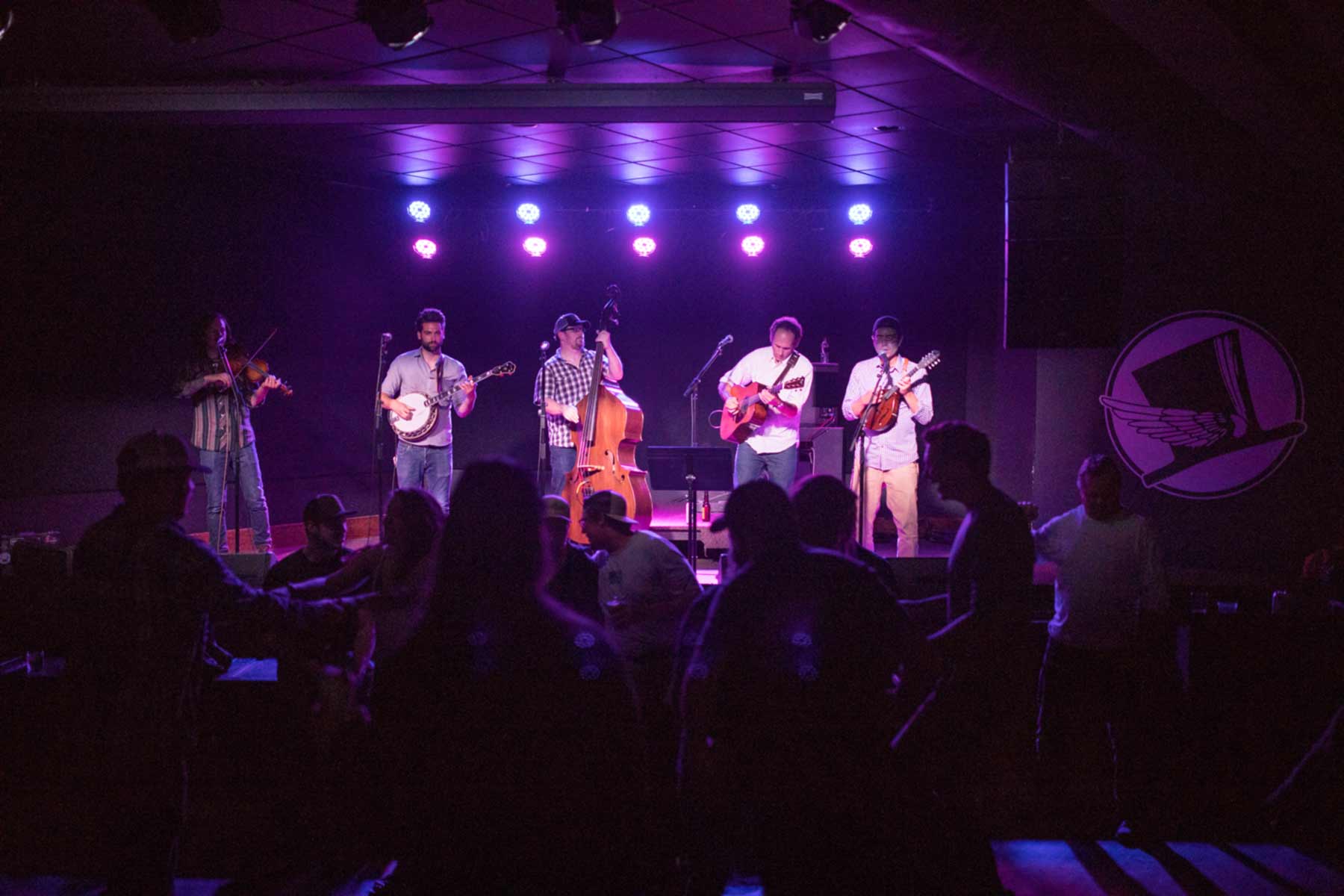
Written by Kathleen Goodwin
Missoula is rapidly rising in the consciousness of many as a music town, and for good reason. Headliners make stops in Missoula on world tours, and festivals are held here each year, but a music scene is about more than the people playing shows on stages or amphitheaters. It is also about the folks working tireless to teach and train the next generation of music producers, consumers, and creators, and that is where folks come in like Mike Morelli, Director of the Entertainment Management Program in College of Business at the University of Montana and director of the Montana Music Summit. Mike sat down with Destination Missoula to discuss the origins of the Entertainment Management Program, the first Montana Music Summit to be held in Missoula, the future of the Missoula music scene, and the role of music in our collective identity.
“[The program started in 2001 with] nine people who had gone to UM and from Montana,” Mike explains. “They were in the music business, and they thought, ‘We have to make it easier for students to get out there and do what we did.’ So they banded together, talked to each other with Larry Gianchetta, Dean of the School of Business and Administration. They worked on the program design together, ran it through the faculty, and ended up designed a certificate program which got approved and its been going ever since.”

The program is a certificate program featuring three or four classes specific to the program including Venue Management, Intro to Entertainment Management, Event Management, and Principles of Entertainment Management. There are about 200 students enrolled in the program each year, and these students come from all over the country and for very different reasons. “Most discover the program when they are here [at the university],” Mike explains, “though we do have students that go online and go look for programs like this and then find this one. This program is very interesting because we have such a strong connection to the people that founded the program. Most of them are still involved: they teach in the program, they offer internships to students and guidance to students when the get out. It’s kind of unbelievable [how many students we have working in the community]. We’re really fortunate in this town: places like Logjam are employing a bunch of our students, and they are staying in Missoula to work here. We also have students in Nashville and New York and Los Angeles, just all over the country working, which is fantastic.”
Missoula is an ideal home for this program for one simple fact: it is an entertainment town. “Missoula has a great entertainment scene. We have wonderful music, a wonderful campus theatre, the Roxy, and of course the world famous Missoula Children’s Theatre and Community Theatre. Not to mention athletics, which is another major component of the entertainment world. Since this program has been around for more than a decade, what we have is a lot of folks who have come through the program who are out there embedded in the community [which contributes to growing the program].”
The students in the Entertainment Management Program have a variety of interests and focuses, Mike says. “A lot of students are interested in music, a lot are interested in mission-driven nonprofits and events, and some are interested in sports. We’ve had a really strong history of students who are interested in music, and because of that we created a pull pattern of interests between students. There are some great student groups, too, like the group who put together Switchback Record Company, a student driven label. They have their first album out and it is really cool, and that is not something we teach in the classroom. We have another student group that raises money so they can go to conferences around the nation [where the students can network and make connections].”

Mike and the other people in the program strive to make important community connections to further the careers of students as well as bolster the Missoula music community as a whole. “Right now in the Principles of Entertainment Management I, we’ve gone out and secured about 30 internships throughout the city and campus. There are about 40-45 students in that class, so 30 of them are working for authors and music venues and athletics and the Dennison Theatre. And meanwhile we have another pool of students who are working events when the happen, like Josh Turner or Casting Crowns.”
One of the program’s main focuses is to get Missoula on the map as a music town and to grow the already existing wealth of music and music knowledge coming out of the community by, for example, hosting events such as Montana Music Summit at the University of Montana. The summit spans over two days and features panelists from around the country, as well as some who call Missoula home.
“There are 20 panelists or so, some locals like Joe Anderson, Nick Checota, and Whitney Williams, but also folks from all over the country. They will be talking about [a wide variety of topics including] creating music festivals, intellectual property in music, and community building through music and culture and the arts, to name a few. We wanted to make it accessible, so it is affordable: $69 for two days, and with that people get to meet the panelists, go to the panels, and go network. But really it’s an opportunity for our students and community to build that networking connection with people who like music. Some panelists are coming from Reverb Nation or Red Bull. It’s great for our students, and it is great for our music community. At the end of the day, what we are trying to do is make sure our students know enough when they graduate to get their first job and to have a connection.”

2018 marks the first Montana Music Summit, and a crowd is expected. “We expect to have 100 students. The room is going to be packed. There are so many local folks who are saying asking to just come for a day or a session, and of course we work with them and find a discounted badge for them. The hope is for this to become an annual event.”
Mike explains that the community support from sponsors made the summit possible, and that it is the community involvement and passion for music that made it a reality. “We have some great sponsors: The Trail, First Interstate, Trailhead, KGBA, Open Range Entertainment, and Rockin’ Rudy’s, and we are really psyched that they are helping us out. Then finally, we couldn’t have done any of this without the grant from Destination Missoula and the Tourism Business Improvement District. When we applied for that grant and received it, that made so many more things possible for us and for the summit.”
The benefits of a summit like this are far and wide, but to Mike, there are two main goals. First, to increase networking opportunities for the students, and secondly, to continue Missoula’s trajectory as a music town.
“[Summits like this] make Missoula a spot in the consciousness of panelists and attendees. It makes them [associate Missoula as a music town], and that is what we want to be. We want to be a music city. I think it is already there, but what we are right now, which is great, are passionate music consumers. We’ve got a lot of cool people coming through here who are music creators, but they are leaving to live elsewhere. If we could be a place where these people stay, that is the goal: for people to go on the road and tour, but then come back and live here in Missoula.”

Over the past decade, the Missoula music scene has seen a boom, and that is due to a lot of factors. Mike explains that “in terms of the market size, Missoula is a tertiary market, but we punch so far above our weight. We’ve got these amazing acts coming through. When you have a guy like Nick Checota out there at Logjam Presents who’s bringing in all kinds of acts and is really ambitious and working on routes with people, our music scene can get better. And then at the same time you have the folks over at the Knitting Factory who are doing the same thing and bringing in such wonderful acts, and that competition creates this huge amount of music, shows, events, and all kinds of wonderful entertainment things that are happening. That energy builds on itself. Also, I can't tell you how many young bands I've talked to who want to eventually play at places like the Top Hat or the Wilma but are now just looking for a places to play, so they start looking for that and playing places, and that just builds on itself, too.”
And for Mike, the boom in Missoula expands beyond the city limits: there is a regional benefit to Missoula’s music economy. “When a band is coming to Missoula, their next stop is at times all the way to Denver, so they think ‘well, where else can I play?’ So they go to Whitefish, Kalispell, or Bozeman, and all the sudden those types of incremental stops build more regional music and more opportunities for people. The things that are going on here in this incredible explosion of music have really elevated the scale of what Missoula’s music scene can offer and what people expect.”
“As the music scene grows,” Mike continues, “the program will expand and grow. I don’t know that our students understand how driven the entire city is to make sure they succeed. And if we can do that with music, then that is just fantastic.”
The first Montana Music Summit will take place on October 12-13, 2018, at the University of Montana.